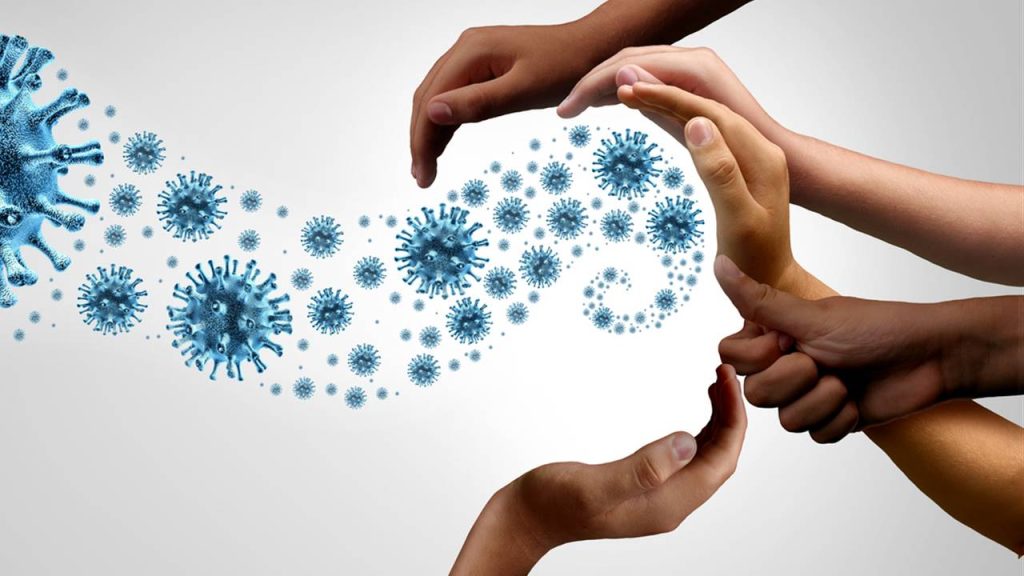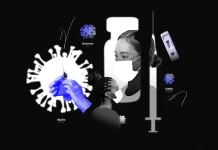The body has a complex defense mechanism: the immune system. Knowing how it works and reinforcing the action of its components is essential.

- Immune system: what is it
- Innate immunity: what is it
- Learned immunity: what is it
- How to strengthen the immune system quickly
The immune system defends us against known enemies and is able to mobilize against any foreign substance with which it comes into contact, even for the first time.
Since childhood, we live surrounded by viruses, bacteria and all kinds of germs, and it is good that it is so. The coexistence with these microorganisms allows our immune system to know them and register them and develop effective defenses against them that, in the future, may be useful. In addition, many people wonder how to improve the immune system quickly and, as we will explain in this article, it is: leading a healthy life and maintaining a positive attitude contribute to strengthening this protection system.
IMMUNE SYSTEM: WHAT IS IT
The system is a complex network of cells, tissues, and organs that work together to help the body prevent and fight infection.
NATURAL IMMUNE SYSTEM BARRIERS
The best way to combat the action of germs is to prevent their entry into the body. For this, it has important natural barriers that act in the first instance:
- Skin. It is the largest organ in the body and is able to prevent the invasion of many undesirable microorganisms, unless it is physically damaged (an injury, an insect bite or a burn).
- Mucous membranes. Mucous membranes (linings of the airways and intestine) are usually covered with germ-fighting secretions.
- Tears, which lubricate eye membranes, contain lysozymes (an enzyme), which act as a natural antibiotic, attacking bacteria and protecting the eyes from disease.
- The passages of the nose, with the walls covered with mucus, filter much of the incoming germs, with sneezing being a quick way to eliminate them.
- In the lower respiratory tract, cilia (hair-like prominences) expel any microorganisms that have reached the lung from the lung. Also, the cough favors its elimination.
- Chemical secretions. Stomach acid and the antibacterial activity of pancreatic enzymes, bile and intestinal secretions are effective barriers to protect the gastrointestinal tract. The acidic environment of the vagina is also a protective element, as well as the dragging effect that the bladder produces when empty.
DEFENSES IN THE IMMUNE SYSTEM
Despite their sophistication, natural barriers often fail, or are simply insufficient to fight certain infections.
If germs enter the body, the defenses of the immune system are activated, which although they have a complex functioning, follow a simple basic strategy: recognize the enemy (an antigen), mobilize the defenses and attack.
To do this, the immune system has its own circulation system (lymphatic vessels) that covers the entire body and through which the cells and substances that are involved in the immune response move.
Lymph circulates through the lymphatic vessels, a fluid rich in white blood cells (the most important cells of the immune system) that helps return water, proteins, and other substances in body tissues to the bloodstream.
In connection with the lymphatic vessels there is a network of nodes, which are usually grouped into areas where the vessels branch (neck, armpits, groin).
All substances absorbed by the lymph pass through at least one lymph node, which has a network of lymphocytes (a type of white blood cell) that filter, attack, and destroy any substance they deem harmful.
In addition, there are special areas (thymus, tonsils, bone marrow, spleen, liver, intestine) in which it is possible to recruit lymphocytes and mobilize them to specific areas where it is necessary to act.
This complex system makes it possible to quickly organize an immune response wherever it is needed.
So, a wound on a finger can cause an inflammation of the elbow node or a throat infection can inflame the nodes under the chin. The reason for this relationship is that the lymphatic vessels drain the inject and transport it to the point where it is possible to fight it: in the node.
FEVER AS A NATURAL DEFENSE
In addition to a symptom of illness, fever is a reaction of the body to an infection or injury in order to restore balance.
A high body temperature stimulates defense mechanisms, in particular the production of macrophage cells, and at the same time slows down the reproduction of some microorganisms that do not survive temperatures above the body average.
It is therefore a mistake to fight fever routinely, even if it is a cause of discomfort, since it blocks a natural defense system and can mask a more serious illness.
However, when the patient’s temperature exceeds 40 ºC or those who suffer from it are children, it is necessary to remain very attentive, because if seizures appear, action must be taken. In this case it is advisable to use a method that reduces fever gradually to avoid a possible rebound effect.
INNATE IMMUNITY: WHAT IS IT
We are all born with a natural immunity, in which some white blood cells (macrophages and neutrophils) and a group of proteins that are activated in chain participate.
All these components of the immune system react similarly to all foreign substances, the recognition of which does not vary from person to person.
Macrophages and neutrophils are white blood cells that ingest microbes once the immune system has signaled them to be destroyed. They usually work together when problems arise.
Macrophages are found in strategic areas, where organs contact blood or the outside, and they are the ones who initiate the response and send signals to their allies to come and strengthen the defense.
Neutrophils, which flow through the blood, pass into tissues upon alert and add to the destruction of microbes.
All these white blood cells contain enzymes inside, which allow them to destroy foreign molecules, once ingested. The accumulation of neutrophils at a point of infection and the death and digestion of microbes form pus.
LEARNED IMMUNITY: WHAT IS IT
From birth, the immune system registers the antigens it encounters, either through the lungs (when breathing), intestine (eating) or skin, and learns to respond to each of them.
This immunity, unlike innate immunity, is specific to each person, and depends on your immune system’s ability to learn and remember.
However, the innate mechanisms and those learned usually act together, not always coordinated, in the face of an infection.
The reason why the immune system is able to keep track of every antigen it finds is in the nature of lymphocytes, the main cells of the immune system and that, unlike others, can live for years or even decades.
Lymphocytes are the ones that manage this registry, and when they find a foreign substance for the second time, they are able to develop a rapid and concrete response, which explains why diseases such as chickenpox are not contracted more than once or why vaccines prevent some diseases.
That substance that the body identifies as a risk substance can come from outside (a bacterium, a toxin) or be a product of the body itself (a precancerous cell or a neuron in poor condition).
By detecting a foreign molecule, the immune system can make antibodies, which attach to antigens to signal them as a target to destroy.
By categories, B lymphocytes are responsible for secreting antibodies; They are derived from a bone marrow stem cell and mature into plasma cells.
T lymphocytes are part of the surveillance immune system; They are formed from stem cells that migrate from the bone marrow to the thymus, where they divide and mature, and learn to differentiate self and foreign, before entering the lymphatic system.
Antibodies, also called immunoglobins, are therefore proteins that interact with the antigen that initially stimulates B lymphocytes. There are five types of immunoglobins, of which three should be highlighted:
- Immunoglobin G. It is the most common antibody and occurs after several exposures to an antigen (for example after receiving a tetanus vaccine booster); It is the only one that is transmitted from mother to fetus and protects the newborn until it develops its own antibodies.
- Immunoglobin A. It is found in the blood and in some secretions (from the intestinal tract, nose, eyes, lungs, breast milk); It performs an important function in the face of an invasion of microorganisms through a mucous membrane.
- Immunoglobin E. It is active against parasites and is also the antibody that generates immediate allergic reactions.
HOW TO STRENGTHEN THE IMMUNE SYSTEM QUICKLY
Our defenses depend largely on lifestyle habits. Some natural remedies help us improve our immune system quickly.
DIET TO IMPROVE THE IMMUNE SYSTEM
A healthy, balanced diet that provides the vitamins and minerals that the body needs.
The Mediterranean diet is a good protective agent for its richness and variety of nutrients and antioxidant substances. Generally speaking, these are the most effective allies:
- Raw vegetables. For its high content of vitamins, minerals and phytonutrients.
- Olive oil and, in general, monoi sane fatty acids, which stimulate the immune response.
- Yogurt. The probiotic bacteria it contains, also present in fermented cabbage, stimulate the intestinal flora and regulate the defenses.
- Antioxidants. They act against free radicals and are obtained mainly from raw fruits and vegetables, hence the convenience of taking them daily.
- Zinc. Strengthens a depressed immune system. Its deficiency alters cellular immunity. It abounds in pumpkin, sesame and sunflower seeds, wheat germ oil, mature cheese, legumes, peanuts, oysters …
- Vitamin C. It stimulates the action of white blood cells and promotes the production of interferon, a substance that defends us from various viruses. Its best sources are: citrus, kiwi, mango, cabbage, red pepper, tomato, berries …
- Vitamin E. Its antioxidant capacity extends to the cells involved in the immune response. It is present in wheat germ oil, nuts, olive oil, avocado…
- Vitamin A. It favors the production of different defense cells, such as T lymphocytes. It is obtained from the consumption of cheese, eggs, carrots and green vegetables, sweet potato, cabbages…
- Iron. Its deficiency facilitates the risk of contracting infections and decreases the immune response. Meats, legumes, wheat germ and virgin olive oils, almonds, clams… are its main sources.
In contrast, refined sugar, with proven negative effects on the immune system, and alcohol should be moderated.
Sugar reduces the ability of leukocytes to destroy germs, while alcohol weakens them and decreases their mobility.
Diet is also key in rebalancing the immune system after infection. In general, to regulate organic pH and intestinal flora, it is advisable to take foods of plant origin and reduce those of animal origin.
NATURAL REMEDIES THAT PROTECT THE IMMUNE SYSTEM
Phytotherapy has been shown to be very effective in protecting the immune system while increasing natural defenses.
1. Echinacea. Echinacea is a great ally against infections because of its preventive effect: it activates the formation of leukocytes and prevents the development of viruses or bacteria.
Prevents respiratory infections and prevents relapses. It is mainly indicated to protect vulnerable organisms, although its effectiveness in children is insufficiently demonstrated.
It is also recommended in skin conditions for its purifying and purifying action of the blood.
2. Ginseng. Ginseng is a powerful tonic stimulating the nervous system and defenses. By nature, it is a plant adapted to develop in difficult habitats and it would seem that it transmits this characteristic to those who take it.
Eleuthero coccus also falls into this category of adaptogenic plants, as it helps the body regulate itself, being very useful when stress weakens the body’s resistance.
3. Garlic. Garlic increases the body’s defenses and is indicated in case of infection, either respiratory or digestive, although its most remarkable virtue is as a regulator of blood flow.
The architects of these virtues are the sulfur compounds it contains: allicin, ajoene and allyl trisulfide. To benefit from its effects, it is advisable to consume 1 or 2 raw garlic cloves a day. In excess it can irritate the digestive tract.
4. Licorice. Licorice is effective in the production of antibodies and in the regulation of leukocytes and is a good general tonic in periods of convalescence, but it is not suitable for hypertensive patients.
It also exerts an expectorant, antibacterial, cholagogue and demulcent action, so it is a good ally to protect the mucous membranes of the respiratory and digestive system.
It can be taken in decoction, tincture, fluid extract, powders or plant juice.
5. Propolis. Propolis is a resinous substance that bees obtain from the buds of trees and some plants, and then finish processing themselves in order to cover the walls of the hive and protect younger bees from possible diseases.
The protective action of propolis is due to its richness in flavonoids, substances that stimulate the production of antibodies and enhance the action of vitamins.
AVOID STRESS
Each person perceives stress differently, but it has been shown that immunity weakens if stress is prolonged excessively.
For a long time, it was believed that the immune system escaped the control that the central nervous system exerts on the body. However, it has been shown that there is bidirectional communication between these two systems, which can be key to the proper functioning of both.
These are direct evidences, anatomical and physiological, but also indirect, which show that the immune system is influenced by factors such as mood, hope or beliefs.
Negative stress is a good example of this double influence, since the body’s response depends on the perception of each person.
Therefore, a situation that generates stress, whether of physical or emotional origin, modifies physiological functions that weaken the immune response due to the interaction of the central, endocrine and immune nervous systems that occurs in any stress response.
Faced with an external stimulus, the nervous system processes this information based on the state of each person and their past experiences, which help them interpret. The physiological result of this process is a desire to flee from the situation that provokes it or to confront it.
The brain interprets that information and sends chemical signals that activate the secretion of hormones in the adrenal glands and have a suppressive effect on the immune response.
Specifically, glucocorticoids are secreted through the neuroendrocrine pathway and catecholamines, noradrenaline and adrenaline are released at the level of the medullary area of the adrenal gland.
When stress lasts a long time, the body ends up weakening due to the permanent state of alert to which it is subjected, and may even get sick.
HOW DO AUTOIMMUNE REACTIONS ARISE?
All this defensive potential is sometimes blocked by malfunctioning, which leads to autoimmune reactions.
This happens when the immune system confuses harmless microorganisms with germs (in the case of allergies) or attacks the body’s own tissues -in the case of autoimmune diseases-, since it does not recognize them as its own.
In allergies, the immune system reacts disproportionately, through the production of antibodies, against external substances that are initially harmless, such as the hair of some animals, dust or pollen.
Autoimmune diseases are caused by another error of immune cells, which make antibodies against healthy tissues. Some of the most frequent are:
- multiple sclerosis, characterized by lesions in the cells of the central nervous system;
- rheumatoid arthritis, an inflammatory disease that affects connective tissue in the joints;
- and type I diabetes, in which antibodies destroy the cells responsible for making insulin in the pancreas.
Among the causes of this type of reactions, it is pointed out that hygienic habits have decreased contact with germs and the incidence of infections in childhood, which would hinder the task of recording and inventorying germs by the body.
This theory is supported by the fact that these types of disorders are becoming more frequent in developed countries.



